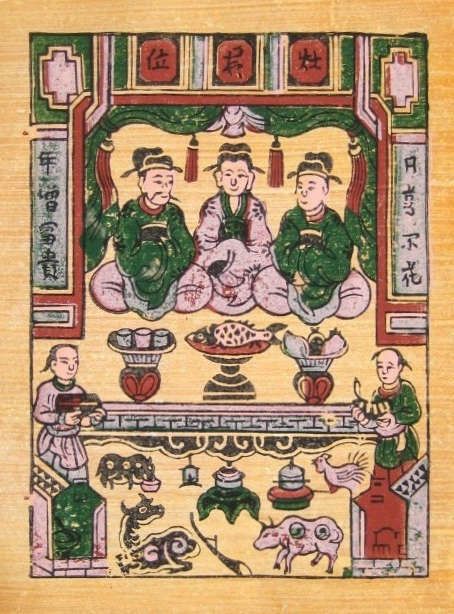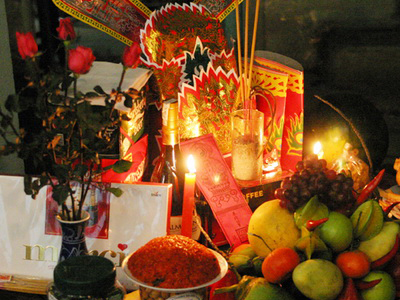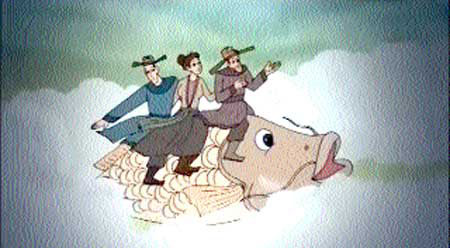The stove is considered the soul of the family. The Vietnamese believed that good stoves will guarantee peace in the family, while bad ones bring strife. The standing mud-covered brick stoves in a traditional Vietnamese kitchen are huge. They are built up from the floor against a wall of the kitchen and look something like altars and in fact, they are. The family stove, apart from its functional importance, was believed to house the Kitchen God, also called the Lord of the Hearth, one of the oldest gods worshipped in Vietnam.
Hang Ma is the street where sacred papers are sold and it entered its busy period around one month ago. The street is decorated in red and yellow, the colors of traditional sacred paper products. Today Ma street seem become more crowed with people. They are flocking the street and buy worship items for the Kitchen God’s day (23rd of the last month of lunar year).
To prepare for the journey of Kitchen God to the Heaven, the worship items are included: Votive, snacks, sweet cakes, fruit… Votives with paper carps, horses and clothing (hats, robes and boots), are very important. Following the old legend and still in some countryside homes, cooking occurs over clay tripods. Three stones were all that was needed to hold up the pot over the fire. Few people spend time thinking about the nature of the Kitchen Gods or the specific meaning of the items that are associated with them. The three Hearth Gods are represented at Tet by three hats and shops sell sets of three miniature paper hats: two men’s hats and one woman’s. These are burned as offerings to Ong Tao. The God will also need a new pair of boots to wear as he travels to Heaven. Two favorite gifts for the triad of household deities are gold and wine. In the central part of Vietnam, cooking tripods or blocks that make up the family hearth, even if they are still usable, are ritually discarded when the God leaves. One week later, new blocks will greet his return or the arrival of his replacement assigned by the Jade Emperor.
Nowadays, Everything changes, people think that :Tran sao am vay(Life in the earth is same underworld). That’s why besides the traditional worship items, they burn modern funiture like: paper mobile, paper house, paper motorbike…
After the Kitchen God has left, preparations one week ( from 23rd to 30th of lunar month) for the New Year festivities begin. After the Kitchen God’s day People will clean and decorate their home with hoping removing old year and welcome New year with good things for their families
* Bonus: ORIGIN OF KINCHEN GODS
In Vietnamese folklore, the Kitchen Gods (Vietnamese: Táo Quân) are spirits that inhabit the kitchen of every home. They are responsible for monitoring the daily affairs of the kitchen, until the last day of the lunar year in which they then travel to Heaven to give the Jade Emperor an annual report. There are three Kitchen Gods: Trọng Cao, Thị Nhi, and Phạm Lang. Originally normal people, the three became kitchen spirits by the magic of the Jade Emperor after hearing their tragic tale. In old Vietnamese kitchens, the traditional clay stove pot is supported by three posts, which represent the three Kitchen Gods.
Origins
Trọng Cao and Thị Nhi were husband and wife. One day they quarreled, and Trọng Cao threw his wife out of the house. Thị Nhi still loved her husband but had no choice but to obey. She set off on a journey and eventually found a nice man, Phạm Lang, and they eventually married. Trọng Cao was filled with remorse, waited for his wife’s return, until he could wait no more. He set out in search for her, but eventually ran out of food. He had to beg for food. One day he knocked on a door, and found, to his surprise, his (former) wife. Remembering her love for her first husband and moved by his presence, she invited him inside and fed him. Phạm Lang was then heard coming home. Thị Nhi could not be seen with another man inside the house, so she had Trọng Cao hide in a straw of hay. Phạm Lang lit the hay on fire in order to create fertilizer. Trọng Cao dared not move so that he may preserve his wife’s virtue, and so accepted his fate. Thị Nhi could not save her first husband, and did not want to tell the truth, lest she be branded an infidel, and so she jumped into the fire. Phạm Lang, unable to comprehend why his wife jumped in the fire, decided to jump into the fire with her. The Jade Emperor heard this tale, and was moved, and so used his power to bind the three souls to become the spirits of the kitchen.




